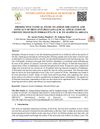 June 2023 in “Dermatology and therapy”
June 2023 in “Dermatology and therapy” Doctors in the Middle East need better treatments and more knowledge about new therapies for hair loss condition Alopecia Areata.
 January 2023 in “Frontiers in bioscience”
January 2023 in “Frontiers in bioscience” Artemis protein may help control hair growth and health by influencing cell processes.
 November 2022 in “Journal of Education, Health and Sport”
November 2022 in “Journal of Education, Health and Sport” The skin's bacteria might influence the development of a hair loss condition called alopecia areata.
 September 2022 in “Skin appendage disorders”
September 2022 in “Skin appendage disorders” Seborrheic dermatitis may contribute to the development of central centrifugal cicatricial alopecia.
 September 2022 in “Dermatology and therapy”
September 2022 in “Dermatology and therapy” Contact immunotherapy might help treat various skin conditions, but more research is needed to confirm its safety and effectiveness.

Vitamin D is crucial for skin health and managing skin diseases.
 March 2022 in “Nepal Journal of Dermatology Venereology & Leprology”
March 2022 in “Nepal Journal of Dermatology Venereology & Leprology” Methotrexate with steroids is slightly more effective than azathioprine with steroids for treating severe alopecia areata.
 January 2022 in “Open Access Macedonian Journal of Medical Sciences”
January 2022 in “Open Access Macedonian Journal of Medical Sciences” A 5-year-old boy with alopecia totalis had temporary hair regrowth with treatment but relapsed, highlighting the need for thorough investigation and holistic care.
 June 2021 in “bioRxiv (Cold Spring Harbor Laboratory)”
June 2021 in “bioRxiv (Cold Spring Harbor Laboratory)” The gene Tfap2b is essential for creating a type of stem cell in zebrafish that can become different pigment cells.

Alopecia Areata has no cure, treatments are limited, and the condition often recurs, but new therapies like JAK inhibitors show promise.
 December 2020 in “Current Sexual Health Reports”
December 2020 in “Current Sexual Health Reports” Finasteride can have lasting negative effects on brain function and behavior by disrupting neurosteroid production.
 April 2020 in “IP Indian journal of clinical and experimental dermatology”
April 2020 in “IP Indian journal of clinical and experimental dermatology” Many children with alopecia areata also have other autoimmune diseases.
 March 2020 in “The Journal of animal and plant sciences/The JAPS”
March 2020 in “The Journal of animal and plant sciences/The JAPS” Aloe Vera helps wounds heal faster and promotes hair growth.
 July 2018 in “International journal of research - granthaalayah”
July 2018 in “International journal of research - granthaalayah” Croton tiglium application significantly improved hair regrowth in alopecia areata patients.
 June 2017 in “Experimental and Therapeutic Medicine”
June 2017 in “Experimental and Therapeutic Medicine” The anti-CXCL4 antibody helps mice grow hair faster and prevents hair loss.
 January 2017 in “Journal of cosmetology & trichology”
January 2017 in “Journal of cosmetology & trichology” A man with severe hair loss regrew hair after hormone treatment.
 January 2015 in “Przegla̧d dermatologiczny”
January 2015 in “Przegla̧d dermatologiczny” 308 nm excimer light therapy may help hair regrowth in alopecia areata with delayed results and no serious side effects.
 January 2015 in “Springer eBooks”
January 2015 in “Springer eBooks” Hormones affect skin aging, and treatments targeting hormonal balance may improve skin health.
 July 2013 in “Our Dermatology Online”
July 2013 in “Our Dermatology Online” Oral methylprednisolone pulse therapy helped an 11-year-old regrow 80% of his hair in six months.
 September 2012 in “The Egyptian Journal of Histology”
September 2012 in “The Egyptian Journal of Histology” Flutamide caused damage to male rat reproductive organs and may affect fertility.
 April 2012 in “Informa Healthcare eBooks”
April 2012 in “Informa Healthcare eBooks” Alopecia areata is a common autoimmune condition causing varying hair loss, diagnosed by specific patterns of inflammation around hair follicles, with several treatment options available.
 July 2008 in “Biomedical Imaging and Intervention Journal”
July 2008 in “Biomedical Imaging and Intervention Journal” New cancer treatments are more precise and less toxic, improving survival rates, but Asia faces challenges in adopting these advancements.
 April 2003 in “Experimental Dermatology”
April 2003 in “Experimental Dermatology” The workshop highlighted the genetic links and psychological impacts of hair loss and skin disorders.

Topical corticosteroid treatment showed no significant difference from placebo in treating alopecia areata in children.
 January 2000 in “BioScience”
January 2000 in “BioScience” The document concludes that understanding hair biology is key to treating hair disorders, with gene therapy showing potential as a future treatment.
 February 1990 in “Journal of The American Academy of Dermatology”
February 1990 in “Journal of The American Academy of Dermatology” New skin treatments in 1987-1988 showed effectiveness for various conditions, but some had side effects or risks.
 June 2022 in “International Journal of Biomedicine”
June 2022 in “International Journal of Biomedicine” Erbium YAG laser treatment, combined with conventional therapy, can effectively reduce hair loss and promote hair growth in men with androgenetic alopecia.
 December 2020 in “Skin appendage disorders”
December 2020 in “Skin appendage disorders” Finasteride may effectively treat hair loss in Klinefelter Syndrome patients.
 November 2020 in “Psychoneuroendocrinology”
November 2020 in “Psychoneuroendocrinology” Finasteride might affect memory by impacting cholinergic system.
 July 2020 in “Environmental Science and Pollution Research”
July 2020 in “Environmental Science and Pollution Research” Finasteride harms invertebrates' survival and burial ability.





























